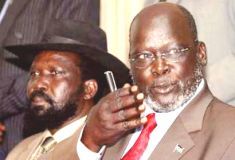Garang outlines priorities for southern Sudan
KHARTOUM, May 28, 2005 (Sudan Tribune) — The chairman of Sudan People’s Liberation Movement (SPLM), John Garang, and the Sudanese first vice-president, Ali Osman Mohamed Taha, had a live debate broadcast on Sudanese TV.

|
|
Sudan’s People Liberation Army leader John Garang (R), flanked by his deputy Commander Salva Kiir Majardit, answers a question during an SPLA press conference in Kenya’s capital Nairobi, January 8, 2005. (Reuters) . |
The debate was devoted to the progress of the peace process and the review of the constitution as well as the future priorities for Sudan.
A number of leaders of the political parties took part in the debate either through satellite link or over the telephone. The debate was hosted by TV presenter Zubayr Uthman Ahmad. John Garang was speaking from Rumbek, while the vice-president was in the TV studio in Khartoum. T
he following is an excerpt from John Garang’s answer to a question regarding the priorities for the south broadcast by Sudanese TV on 28 May:
Yes, we do have a vision and programmes. We want to start with the displaced in the north, and the refugees in neighbouring countries. These are our first priority, because we want the people of the south to return home. There could not be any development without people. This was one of the issues that we had tabled at the Oslo donors’ conference.
I will also raise it with UN Secretary-General Kofi Annan, whom I am meeting tomorrow, to show the priority nature and the importance of the process of repatriation of the displaced and the refugees who should return to the south.
Stability will be reached when the citizens of the south return home.
The same thing applies to Darfur. According to reports, there are 2 million people displaced inside the country. We need to reach a fair agreement in Darfur so that people return home in order to start the process of development.
Following the return of the displaced and the refugees, we will start the process of forming a government. We need governance to reach stability. We will form the government of the south according to the peace agreement, as well as the states’ governments.
We will sort out the problem of the other armed groups in the south by the end of the coming month of June. They will have to join the government institutions or those of the SPLM so that we can reach full stability and security in the south in order to start the process of development. These are fundamental issues which must take place.
Then the infrastructure: We will give priority to building roads. We have selected 13 main roads, so that there would be free movement of people, goods and services. Development cannot take place without this. Finance infrastructure: Banks, and so on; telecommunications. We will use the Nile for transport.
Then the provision of services: We in the SPLM, despite difficult conditions, have more than 3,000 primary schools, and 32 higher secondary schools. We will give priority to human resources development: people’s development. We have said that there should be universal primary education. Every boy and girl should go to school at the age of six. We need to provide Health, building of hospitals in the country side, water.
Then the agricultural development: Over 90 per cent of our people are rural areas. We have a vision to take towns. There are not enough towns in the south. We will start new towns for our people in rural areas. We will provide them with everything: Whatever can be found in towns will also be found in rural areas, such as electricity. This is possible in the south. There are many rivers. One can build micro-dams to generate electricity. One can use wind and solar energy in order to generate electricity.
We will have new initiatives and new ways of doing things in order to deliver social services to citizens. This does not apply to the south only. We, as a national political movement, will pay attention to the citizens’ problems everywhere in Sudan.
We do have a vision, and we have many programmes. We also have the commitment to implement the provisions of the peace agreement.
Material provided by the BBC Monitoring Service
